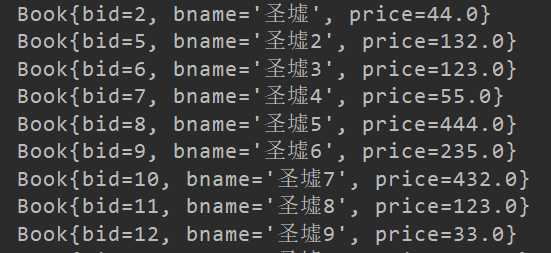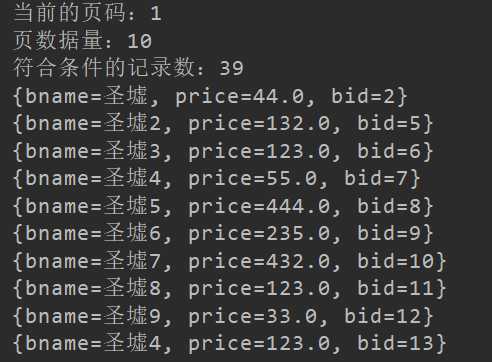标签:特殊字符 varchar 功能 prefix imp help -- servlet 获取
1、mybatis动态sql
2、模糊查询
3、查询返回结果集的处理
4、分页查询
5、特殊字符处理
If、trim、foreach
If 标签判断某一字段是否为空
<select id="list4" resultType="java.util.Map" parameterType="java.util.Map"> select * from t_mvc_book <where> <if test="null != bname and bname !=‘‘"> and bname like #{bname} </if> </where> </select>
trim 标签一般用于去除sql语句中多余的and关键字,逗号,或者给sql语句前拼接 “where“、“set“以及“values(“ 等前缀,或者添加“)“等后缀,可用于选择性插入、更新、删除或者条件查询等操作。
<trim prefix="values (" suffix=")" suffixOverrides="," > <if test="bid != null" > #{bid,jdbcType=INTEGER}, </if> <if test="bname != null" > #{bname,jdbcType=VARCHAR}, </if> <if test="price != null" > #{price,jdbcType=DOUBLE}, </if> </trim>
foreach 标签 遍历集合,批量查询、通常用于in关键字
<select id="selectByIn" resultType="com.liuwenwu.model.Book" parameterType="java.util.List"> select * from t_mvc_book where bid in <foreach collection="bookIds" open="(" close=")" separator="," item="bid"> #{bid} </foreach> </select>
List<Book> selectByIn(@Param("bookIds")List bookIds);
测试
@Test public void selectByIn() { List list = new ArrayList(); list.add(8); list.add(2); list.add(3); list.add(10); List<Book> books = this.bookService.selectByIn(list); for (Book b : books){ System.out.println(b); } }

2.1 参数中直接加入%%
2.2 使用${...}代替#{...}(不建议使用该方式,有SQL注入风险)
关键:#{...}与${...}区别?
参数类型为字符串,#会在前后加单引号[‘],$则直接插入值
注:
1) mybatis中使用OGNL表达式传递参数
2) 优先使用#{...}
3) ${...}方式存在SQL注入风险
2.3 SQL字符串拼接CONCAT
<!--模糊查询--> <select id="selectByLike1" resultType="com.liuwenwu.model.Book" parameterType="java.lang.String"> select * from t_mvc_book where bname like #{bname} </select> <select id="selectByLike2" resultType="com.liuwenwu.model.Book" parameterType="java.lang.String"> select * from t_mvc_book where bname like ‘${bname}‘ </select> <select id="selectByLike3" resultType="com.liuwenwu.model.Book" parameterType="java.lang.String"> select * from t_mvc_book where bname like concat(concat(‘%‘,#{bname}),‘%‘) </select>
List<Book> selectByLike1(@Param("bname")String bname); List<Book> selectByLike2(@Param("bname")String bname); List<Book> selectByLike3(@Param("bname")String bname);
测试
@Test public void selectByLike() { // List<Book> books = this.bookService.selectByLike1(StringUtil.toLikeStr("圣墟")); // List<Book> books = this.bookService.selectByLike2("%圣墟% or bid !=1"); List<Book> books = this.bookService.selectByLike3("圣墟"); for (Book b : books){ System.out.println(b); } }
结果:

resultMap:适合使用返回值是自定义实体类的情况
resultType:适合使用返回值的数据类型是非自定义的,即jdk的提供的类型
3.1 使用resultMap返回自定义类型集合
3.2 使用resultType返回List<T>
3.3 使用resultType返回单个对象
3.4 使用resultType返回List<Map>,适用于多表查询返回结果集
3.5 使用resultType返回Map<String,Object>,适用于多表查询返回单个结果集
<!--3、查询返回结果集的处理--> <select id="list1" resultMap="BaseResultMap"> select * from t_mvc_book </select> <select id="list2" resultType="com.liuwenwu.model.Book"> select * from t_mvc_book </select> <select id="list3" resultType="com.liuwenwu.model.Book" parameterType="com.liuwenwu.model.BookVo"> select * from t_mvc_book where bid in <foreach collection="bookIds" open="(" close=")" separator="," item="bid"> #{bid} </foreach> </select> <select id="list4" resultType="java.util.Map" parameterType="java.util.Map"> select * from t_mvc_book <where> <if test="null != bname and bname !=‘‘"> and bname like #{bname} </if> </where> </select> <select id="list5" resultType="java.util.Map" parameterType="java.util.Map"> select * from t_mvc_book <where> <if test="null != bid and bid !=‘‘"> and bid = #{bid} </if> </where> </select>
// 3.1 使用resultMap返回自定义类型集合 List<Book> list1(); // 3.2 使用resultType返回List<T> List<Book> list2(); // 3.3 使用resultType返回单个对象 Book list3(BookVo bookVo); // 3.4 使用resultType返回List<Map>,适用于多表查询返回结果集 List<Map> list4(Map map); // 3.5 使用resultType返回Map<String,Object>,适用于多表查询返回单个结果集 Map list5(Map map);
测试:
@Test public void list() { // 返回一个resultMap但是使用list<T>接收 // List<Book> books = this.bookService.list1(); // 返回的是resulttype使用list<T>接收 // List<Book> books = this.bookService.list2(); // 返回的是resulttype使用list<T>接收 // for (Book b : books){ // System.out.println(b); // } // 返回的是resulttype使用T接收 // BookVo bookVo =new BookVo(); // List list = new ArrayList(); // list.add(2); // bookVo.setBookIds(list); // Book book = this.bookService.list3(bookVo); // System.out.println(book); // 返回的是resulttype使用list<Map>接收 Map map =new HashMap(); // map.put("bname",StringUtil.toLikeStr("圣墟")); // List<Map> list = this.bookService.list4(map); // for (Map m : list) { // System.out.println(m); // } // 返回的是resulttype使用Map接收 map.put("bid",2); Map m = this.bookService.list5(map); System.out.println(m); }
结果:

为什么要重写mybatis的分页?
Mybatis的分页功能很弱,它是基于内存的分页(查出所有记录再按偏移量offset和边界limit取结果),在大数据量的情况下这样的分页基本上是没有用的
使用分页插件步奏
1、导入pom依赖
2、Mybatis.cfg.xml配置拦截器
3、使用PageHelper进行分页
4、处理分页结果
Pom依赖
<dependency>
<groupId>com.github.pagehelper</groupId>
<artifactId>pagehelper</artifactId>
<version>5.1.2</version>
</dependency>
Mybatis.cfg.xml配置拦截器
<plugins>
<!-- 配置分页插件PageHelper, 4.0.0以后的版本支持自动识别使用的数据库 -->
<plugin interceptor="com.github.pagehelper.PageInterceptor">
</plugin>
</plugins>
<select id="list4" resultType="java.util.Map" parameterType="java.util.Map"> select * from t_mvc_book <where> <if test="null != bname and bname !=‘‘"> and bname like #{bname} </if> </where> </select>
@Override public List<Map> listPager(Map map, PageBean pageBean) { if(pageBean!=null && pageBean.isPagination()){ PageHelper.startPage(pageBean.getPage(),pageBean.getRows()); } List<Map> list = this.bookMapper.list4(map); if(pageBean!=null && pageBean.isPagination()){ PageInfo pageInfo =new PageInfo(list); System.out.println("当前的页码:"+pageInfo.getPageNum()); System.out.println("页数据量:"+pageInfo.getPageSize()); System.out.println("符合条件的记录数:"+pageInfo.getTotal()); pageBean.setTotal(pageInfo.getTotal()+""); } return list; }
测试:
@Test public void listPager() { Map map =new HashMap(); map.put("bname",StringUtil.toLikeStr("圣墟")); PageBean pageBean =new PageBean(); pageBean.setPage(3); // pageBean.setPagination(false); List<Map> list = this.bookService.listPager(map, pageBean); for (Map m : list) { System.out.println(m); } }
结果:

>(>)
<(<)
&(&)
空格( )
<![CDATA[ <= ]]>
<select id="list6" resultType="java.util.Map" parameterType="com.liuwenwu.model.BookVo"> select * from t_mvc_book <where> <if test="null != min and min !=‘‘"> and price > #{min} </if> <if test="null != max and max !=‘‘"> and price < #{max} </if> </where> </select> <select id="list7" resultType="java.util.Map" parameterType="com.liuwenwu.model.BookVo"> select * from t_mvc_book <where> <if test="null != min and min !=‘‘"> <![CDATA[ and price > #{min} ]]> </if> <if test="null != max and max !=‘‘"> <![CDATA[ and price < #{max} ]]> </if> </where> </select>
// 特殊字符的处理方式 List<Map> list6(BookVo bookVo); List<Map> list7(BookVo bookVo);
测试:
@Test public void listSpecoal() { BookVo bookVo =new BookVo(); bookVo.setMin(100.0); bookVo.setMax(500.0); // List<Map> list = this.bookService.list6(bookVo); List<Map> list = this.bookService.list7(bookVo); for (Map map : list) { System.out.println(map); } }
相关代码
PageBean 分页工具类
package com.liuwenwu.util; import java.io.Serializable; import java.util.Map; import javax.servlet.http.HttpServletRequest; public class PageBean implements Serializable { private static final long serialVersionUID = 2422581023658455731L; //页码 private int page=1; //每页显示记录数 private int rows=10; //总记录数 private int total=0; //是否分页 private boolean isPagination=true; //上一次的请求路径 private String url; //获取所有的请求参数 private Map<String,String[]> map; public PageBean() { super(); } //设置请求参数 public void setRequest(HttpServletRequest req) { String page=req.getParameter("page"); String rows=req.getParameter("rows"); String pagination=req.getParameter("pagination"); this.setPage(page); this.setRows(rows); this.setPagination(pagination); this.url=req.getContextPath()+req.getServletPath(); this.map=req.getParameterMap(); } public String getUrl() { return url; } public void setUrl(String url) { this.url = url; } public Map<String, String[]> getMap() { return map; } public void setMap(Map<String, String[]> map) { this.map = map; } public int getPage() { return page; } public void setPage(int page) { this.page = page; } public void setPage(String page) { if(null!=page&&!"".equals(page.trim())) this.page = Integer.parseInt(page); } public int getRows() { return rows; } public void setRows(int rows) { this.rows = rows; } public void setRows(String rows) { if(null!=rows&&!"".equals(rows.trim())) this.rows = Integer.parseInt(rows); } public int getTotal() { return total; } public void setTotal(int total) { this.total = total; } public void setTotal(String total) { this.total = Integer.parseInt(total); } public boolean isPagination() { return isPagination; } public void setPagination(boolean isPagination) { this.isPagination = isPagination; } public void setPagination(String isPagination) { if(null!=isPagination&&!"".equals(isPagination.trim())) this.isPagination = Boolean.parseBoolean(isPagination); } /** * 获取分页起始标记位置 * @return */ public int getStartIndex() { //(当前页码-1)*显示记录数 return (this.getPage()-1)*this.rows; } /** * 末页 * @return */ public int getMaxPage() { int totalpage=this.total/this.rows; if(this.total%this.rows!=0) totalpage++; return totalpage; } /** * 下一页 * @return */ public int getNextPage() { int nextPage=this.page+1; if(this.page>=this.getMaxPage()) nextPage=this.getMaxPage(); return nextPage; } /** * 上一页 * @return */ public int getPreivousPage() { int previousPage=this.page-1; if(previousPage<1) previousPage=1; return previousPage; } @Override public String toString() { return "PageBean [page=" + page + ", rows=" + rows + ", total=" + total + ", isPagination=" + isPagination + "]"; } }
Bookvo
vo用来存放包括数据库表映射的字段以及多余的查询条件所需属性列,保证实体类纯粹,降低耦合度
package com.liuwenwu.model; import java.util.List; /** * @author LWW * @site www.lww.com * @company * @create 2019-09-20 19:05 * vo用来存放包括数据库表映射的字段以及多余的查询条件所需属性列 */ public class BookVo extends Book{ private List<String> bookIds; private Double min; private Double max; public Double getMax() { return max; } public void setMax(Double max) { this.max = max; } public Double getMin() { return min; } public void setMin(Double min) { this.min = min; } public List<String> getBookIds() { return bookIds; } public void setBookIds(List<String> bookIds) { this.bookIds = bookIds; } }
BookService
package com.liuwenwu.service; import com.liuwenwu.model.Book; import com.liuwenwu.model.BookVo; import com.liuwenwu.util.PageBean; import org.apache.ibatis.annotations.Param; import java.util.List; import java.util.Map; /** * @author LWW * @site www.lww.com * @company * @create 2019-09-19 22:23 */ public interface BookService { int deleteByPrimaryKey(Integer bid); int insert(Book record); int insertSelective(Book record); Book selectByPrimaryKey(Integer bid); int updateByPrimaryKeySelective(Book record); int updateByPrimaryKey(Book record); List<Book> selectByIn(List bookIds); List<Book> selectByLike1(String bname); List<Book> selectByLike2(String bname); List<Book> selectByLike3(String bname); List<Book> list1(); List<Book> list2(); Book list3(BookVo bookVo); List<Map> list4(Map map); Map list5(Map map); List<Map> listPager(Map map, PageBean pageBean); List<Map> list6(BookVo bookVo); List<Map> list7(BookVo bookVo); }
BookServiceImpl
package com.liuwenwu.service.impl; import com.github.pagehelper.PageHelper; import com.github.pagehelper.PageInfo; import com.liuwenwu.mapper.BookMapper; import com.liuwenwu.model.Book; import com.liuwenwu.model.BookVo; import com.liuwenwu.service.BookService; import com.liuwenwu.util.PageBean; import java.util.List; import java.util.Map; /** * @author LWW * @site www.lww.com * @company * @create 2019-09-19 22:58 */ public class BookServiceImpl implements BookService { private BookMapper bookMapper; public BookMapper getBookMapper() { return bookMapper; } public void setBookMapper(BookMapper bookMapper) { this.bookMapper = bookMapper; } @Override public int deleteByPrimaryKey(Integer bid) { return bookMapper.deleteByPrimaryKey(bid); } @Override public int insert(Book record) { return bookMapper.insert(record); } @Override public int insertSelective(Book record) { return bookMapper.insertSelective(record); } @Override public Book selectByPrimaryKey(Integer bid) { return bookMapper.selectByPrimaryKey(bid); } @Override public int updateByPrimaryKeySelective(Book record) { return bookMapper.updateByPrimaryKeySelective(record); } @Override public int updateByPrimaryKey(Book record) { return bookMapper.updateByPrimaryKey(record); } @Override public List<Book> selectByIn(List bookIds) { return bookMapper.selectByIn(bookIds); } @Override public List<Book> selectByLike1(String bname) { return bookMapper.selectByLike1(bname); } @Override public List<Book> selectByLike2(String bname) { return bookMapper.selectByLike2(bname); } @Override public List<Book> selectByLike3(String bname) { return bookMapper.selectByLike3(bname); } @Override public List<Book> list1() { return bookMapper.list1(); } @Override public List<Book> list2() { return bookMapper.list2(); } @Override public Book list3(BookVo bookVo) { return bookMapper.list3(bookVo); } @Override public List<Map> list4(Map map) { return bookMapper.list4(map); } @Override public Map list5(Map map) { return bookMapper.list5(map); } @Override public List<Map> listPager(Map map, PageBean pageBean) { if(pageBean!=null && pageBean.isPagination()){ PageHelper.startPage(pageBean.getPage(),pageBean.getRows()); } List<Map> list = this.bookMapper.list4(map); if(pageBean!=null && pageBean.isPagination()){ PageInfo pageInfo =new PageInfo(list); System.out.println("当前的页码:"+pageInfo.getPageNum()); System.out.println("页数据量:"+pageInfo.getPageSize()); System.out.println("符合条件的记录数:"+pageInfo.getTotal()); pageBean.setTotal(pageInfo.getTotal()+""); } return list; } @Override public List<Map> list6(BookVo bookVo) { return bookMapper.list6(bookVo); } @Override public List<Map> list7(BookVo bookVo) { return bookMapper.list7(bookVo); } }
标签:特殊字符 varchar 功能 prefix imp help -- servlet 获取
原文地址:https://www.cnblogs.com/liuwenwu9527/p/11566003.html